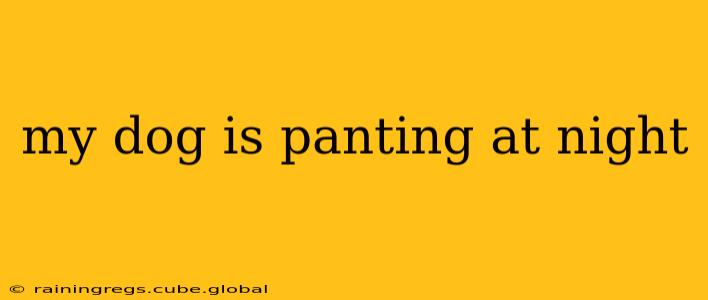Is your furry friend keeping you up at night with their panting? While occasional panting is normal, excessive panting at night can signal underlying health concerns or simply discomfort. This comprehensive guide explores the common reasons why dogs pant at night, helps you distinguish between normal and concerning panting, and outlines when veterinary attention is necessary.
Why Is My Dog Panting at Night? Common Causes
Several factors can contribute to nighttime panting in dogs. Understanding these causes is crucial in determining whether your dog needs immediate veterinary care or if simple adjustments to their environment will suffice.
1. Heat and Temperature Regulation
Dogs primarily pant to regulate their body temperature. Even in cooler environments, a warm sleeping area, thick bedding, or simply a slightly elevated body temperature can lead to increased panting. This is especially true for brachycephalic breeds (dogs with short noses like Bulldogs and Pugs) who have difficulty regulating their body temperature.
2. Anxiety and Stress
Just like humans, dogs can experience anxiety and stress, which manifest as panting. Separation anxiety, fear of the dark, thunderstorms, or even the unfamiliar sounds of the night can trigger panting. Underlying anxieties should be addressed with professional help.
3. Pain or Discomfort
Pain from arthritis, hip dysplasia, or other conditions can cause dogs to pant at night. This panting is often accompanied by other symptoms such as restlessness, whimpering, or changes in behavior.
4. Underlying Medical Conditions
Nighttime panting can indicate more serious health problems like:
- Heart disease: Cardiac issues can cause increased breathing and panting, especially at night when the dog is resting.
- Respiratory infections: Conditions like kennel cough or pneumonia can lead to labored breathing and panting.
- Hyperthyroidism: This condition can increase the dog's metabolic rate, causing increased panting.
- Kidney disease: Kidney problems can cause increased thirst and panting.
5. Medication Side Effects
Certain medications can have panting as a side effect. If your dog recently started a new medication and started panting excessively, consult your veterinarian.
When Should I Worry About My Dog's Nighttime Panting?
While occasional panting is normal, several signs indicate you should seek veterinary attention:
- Excessive panting: Panting that is unusually heavy, rapid, or persists despite attempts to cool your dog down.
- Panting accompanied by other symptoms: Coughing, vomiting, diarrhea, lethargy, restlessness, or changes in urination/defecation.
- Sudden onset of panting: If the panting started suddenly and without any apparent cause.
- Blue or pale gums: This indicates a lack of oxygen and is a serious emergency.
- Difficulty breathing: Noticeable labored breathing or open-mouth breathing.
How Can I Help My Dog Stop Panting at Night?
Depending on the underlying cause, several strategies can help reduce nighttime panting:
- Ensure a cool sleeping environment: Provide a cool, well-ventilated sleeping area. Consider a cooling mat or fan.
- Address anxiety: If anxiety is the cause, work with a veterinarian or certified dog behaviorist to develop a plan to reduce stress.
- Provide comfortable bedding: Ensure your dog has a comfortable bed to support their joints.
- Manage pain: If pain is a factor, consult your veterinarian about pain management options.
What if My Dog is Panting Heavily and Showing Other Symptoms?
If your dog is panting heavily and exhibiting other concerning symptoms (such as those listed above), seek immediate veterinary care. This could be a sign of a serious medical emergency.
Can a change in diet affect my dog's nighttime panting?
While diet changes are unlikely to directly cause excessive nighttime panting, underlying health conditions affected by diet (like obesity or diabetes) can contribute to it. A balanced, healthy diet is important for overall canine health, and may indirectly help manage panting by addressing any related health issues. Consult your veterinarian before making significant dietary changes.
My Dog is Panting at Night, but Seems Otherwise Healthy. Should I Still Be Concerned?
Even if your dog seems otherwise healthy, persistent or excessive nighttime panting warrants a veterinary visit. It's better to be safe than sorry. Early detection of underlying medical conditions can greatly improve your dog's prognosis.
This information is for general knowledge and does not constitute medical advice. Always consult your veterinarian for any concerns about your dog's health. They can provide a proper diagnosis and recommend the best course of action based on your dog's individual needs.
